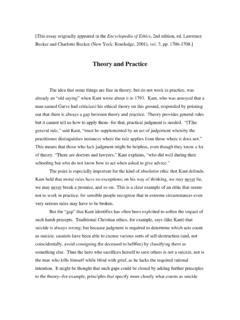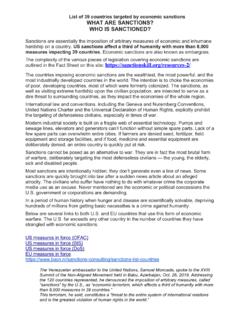Transcription of Killing And Letting Die - James Rachels
1 [This essay originally appeared in the Encyclopedia of Ethics, 2nd edition, ed. Lawrence Becker and Charlotte Becker (New York: Routledge, 2001), vol. 2, pp. 947-50.]. Killing And Letting Die Is it worse to kill someone than to let someone die? It seems obvious to common sense that it is worse. We allow people to die, for example, when we fail to contribute money to famine-relief efforts; but even if we feel somewhat guilty, we do not consider ourselves murderers. Nor do we feel like accessories to murder when we fail to give blood, sign an organ-donor card, or do any of the other things that could save lives. Common sense tells us that, while we may not kill people, our duty to give them aid is much more limited.
2 Some philosophers, however, have argued that common sense is wrong about this. They have defended the Equivalence Thesis, which says that Killing and Letting die are equally bad. This is a more specific version of the idea that there is no moral difference between making something happen and allowing it to happen. The Equivalence Thesis is a radical conception that would require changes in our ordinary moral beliefs. If it is true, then obviously our duty to give aid is much stronger than we commonly assume. But our views about other matters, such as euthanasia, will also be affected. Many people believe that passive euthanasia --allowing terminal patients to die, rather than pointlessly prolonging their lives--is sometimes permissible.
3 But they also believe that Killing patients is always wrong. If the Equivalence Thesis is true, this combination of beliefs is inconsistent. The idea behind the Equivalence Thesis is not that every individual case of Letting die is equally as bad as every individual case of Killing . Obviously, if we compare an ordinary murder--say, a man Killing his wife out of jealousy--with the actions of a physician who humanely permits a suffering patient to die, the murder is much worse. Rather, the idea is that the difference between Killing and Letting die does not itself make a difference to the moral assessment of the actions. Other factors may still be important.
4 2. Thus the fact that the wife was healthy and in the midst of life, while the patient had no prospects but continued pain, makes this particular Killing worse than this particular Letting die. Why do some philosophers believe the Equivalence Thesis is true? One argument appeals to parallel examples. If we consider two cases that are alike except that one involves Killing , whereas the other involves Letting die, it seems that there is no moral difference between them. For example: a woman wants her uncle dead, and she gives him poison in his coffee. Another woman, who also wants her uncle dead, is about to give him poison when she sees him unknowingly drink poison from another source.
5 She watches him die, withholding the antidote in her pocket. Does either woman behave better? If the bare difference between Killing and Letting die were morally important, then the second woman's behavior would be better. But it is not. Therefore, the argument goes, the difference between Killing and Letting die is not morally important. Another argument appeals to the parity of reasons. Whether something is good or bad depends entirely on the reasons that can be given for or against it; therefore, if we have identical reasons for or against two things, they are equally good or bad. With this in mind, suppose we ask why it is bad to kill someone. The basic reason is that the victim loses his or her life: he will not be able to do the things he wanted to do or experience the things he wanted to experience.
6 Secondary reasons may have to do with the effects of his death on others. But it is also bad to let someone die, and if we ask why, we find the very same reasons: the person ends up dead, with the same effects for both him and his survivors. Thus it appears that Killing and Letting die are equally bad. Such arguments establish a prima facie case for the Equivalence Thesis. Most philosophers, however, have not been persuaded. Instead, they have taken these arguments as a challenge to explain why the distinction is, in fact, important. What, exactly, makes Killing worse than Letting die? Here are four purported explanations: First, it has been urged that when we kill someone, we cause the death; whereas if we merely let someone die, something else causes the death, and so we are less blameworthy.
7 This point is often made in connection with the euthanasia cases. In 3. passive euthanasia, the cause of death is the underlying disease, but in active euthanasia it is the physician. That is why active euthanasia is said to be worse. The same holds for the other cases. When a third-world child dies of malnutrition, it is not as though we had sent poisoned food. Second, the duty not to kill is completely dischargeable: most of us can go our whole lives without Killing anyone. But we cannot avoid Letting die. We could spend all our time working to help at-risk children, for example, and still there would be more to do than we could manage. A general duty not to let people die would be impossible to fulfill.
8 Third, if we kill someone, then she is dead, and that's that. But if we fail to save someone, we have not ensured her death, for we leave open the possibility that someone else might come along and save her. That is why all of us, if we were in perilous circumstances, would rather be left alone than killed. Finally, some philosophers believe that Letting die is not as bad as Killing because of the difference in the intentions that accompany the two kinds of action. Someone who kills typically intends to bring about death; whereas someone who merely lets die usually has a different intention. This also explains the difference between the two kinds of euthanasia.
9 The intention in active euthanasia is to bring about death; but in passive euthanasia the intention may be only to end the dying person's suffering. And as for the children in foreign countries, whose deaths we allow by not contributing to relief efforts, we typically have no intention at all regarding them--we give them no thought whatever. The preceding arguments do not appeal to general ethical theories; instead, they attempt to settle the issue without taking sides in the clash between such views as utilitarianism, contract theory, and virtue theory. Another approach, however, would be to say that whether Killing is worse than Letting die simply depends on which of the big theories one accepts.
10 The Equivalence Thesis seems to be a natural part of Utilitarianism. Killing and Letting die have the same consequences--the victim ends up dead--and so, if rightness is determined by consequences, Killing and Letting die should be morally equivalent. 4. Indeed, the Equivalence Thesis is often taken to be simply a utilitarian idea. However, the matter is not clear-cut. One might argue from a rule-utilitarian perspective that it promotes the general welfare to promulgate rules that treat Killing and Letting die differently. Contract theorists, on the other hand, regard moral constraints as social rules that rational people will agree to accept, for their mutual benefit, on condition that other people accept them as well.




